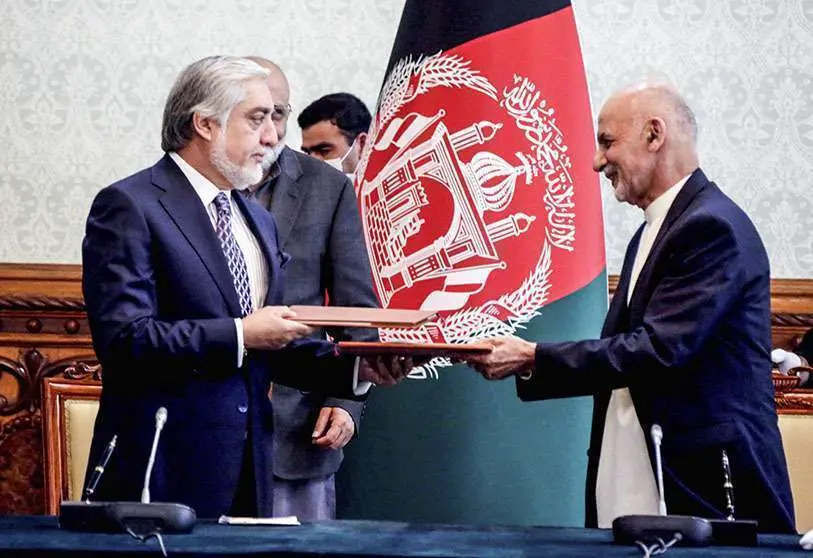Afghanistan's president and his main rival sign a political agreement to end months of instability

Afghanistan's President Ashraf Ghani and his rival Abdullah Abdullah signed a power-sharing agreement on Sunday. The political polarisation of Afghan society became evident following the presidential elections last September. Since then, both Ghani and Abdullah have repeatedly called for leadership in Afghanistan, threatening to increase the political chaos in the country and jeopardising the historic peace agreement signed in Doha between the United States and the Taliban. The signing of this political agreement puts an end to a political crisis that, until now, has overshadowed any effort to end the war that has plagued the country for the last two decades.
In February, the Independent Electoral Commission of Afghanistan (IEC) announced the victory of President Ashraf Ghani with 50.64% of the votes in the September elections. In second place was the current head of the Afghan Executive, Abdullah Abdullah, with 39.52% of the support, who refused to accept these results and defended that he was the one who won at the polls. After questioning these results several times, Abdullah announced the formation of a parallel government, putting the Ghani administration between a rock and a hard place, and at the same time the United States and the Taliban announced a historic peace agreement to restore confidence in a country that has been suffering the consequences of one of the longest war conflicts of the current century.

Political chaos and international pressure have led both sides to start talks to find a way out. The new agreement - whose negotiations were mediated by Afghan political leaders such as former President Hamid Karzai - stipulates that Abdullah will lead the High National Council of Reconciliation, an institution set up to restore confidence in a country that has been embroiled in war for the past few years. This document will also allow several members of the coalition led by Abdullah to become part of the government. "The political agreement signed between Ghani and Abdullah Abdullah has just been signed. Abdullah will head the High Council of National Reconciliation and members of his team will be included in the cabinet," Afghan President Sediq Sediqi's spokesman said on Twitter.
Afghan President Ashraf Ghani has also called for the creation of a High Governance Council, which will give key political leaders the role of advising the president. "Today is a historic day for our beloved Afghanistan. The Afghans have shown that they are committed to their national interests with common thinking. In the coming days, we hope that with unity and cooperation we can lay the foundation for a ceasefire and a lasting peace," said the Afghan President after the signing of the agreement.

"The agreement will facilitate the format of peace talks with the Taliban, as there is now a head of the reconciliation council. But the details will remain difficult. For example, if Mr. Abdullah agrees on one issue, does that mean that President Ghani will also agree, or vice-versa," diplomat Shukria Barakzai told The New York Times.
Until this Sunday, the negotiations between the two leaders were at an impasse, even after the US Secretary of State traveled to Kabul to mediate and try to find a solution to this rift. The American giant decided to withdraw one billion dollars of aid to Afghanistan after this visit in which Pompeo insisted to Ghani and Abdullah to form a National Unity Government. A spokesman for the Asian country's Ministry of Finance has asked Pompeo via the social network Twitter to reconsider returning to help his country economically. "Please reconsider your $1 billion cut in aid. In fact, since we have the COVID-19 pandemic you could add more," he said.

Pompeo welcomed the signing of this power-sharing agreement, but criticised both President Ashraf Ghani and his rival Abdullah Abdullah for taking so long to reach it. "Secretary Pompeo said he regretted the time lost during the political stalemate. He reiterated that the United States' priority remains a political agreement to end the conflict and welcomed the two leaders' commitment to act immediately in support of an early entry into intra-Afghan negotiations," State Department spokesperson Morgan Ortagus said in a statement.
For his part, NATO Secretary General Jens Stoltenberg has also welcomed this agreement and urged the Taliban to reduce violence and for all parties to continue their efforts to achieve peace. The agreement was signed after US special envoy Zalmay Khalilzad said on Friday that a new date for intra-Afghan peace talks was being discussed and that he would soon travel to the region and try to encourage a reduction in violence, Reuters news agency reported. The Indian Foreign Ministry has also spoken out and welcomed this political agreement. In a statement, they called for an immediate ceasefire and for assistance to the people of Afghanistan in dealing with the health crisis caused by the coronavirus.

The United States and the Taliban signed a historic peace agreement in Doha on 29 February, in the presence of international observers and representatives of several countries, and announced the start of inter-Afghan dialogue to end more than 20 years of political, economic and social instability. At present, intra-Afghan negotiations are facing a number of challenges, including an increase in violence in the country. The latest attack took place just a few hours ago after a suicide bomber detonated his explosives near a building of the special unit of the National Directorate of Security (NDS) in Ghazni province.








